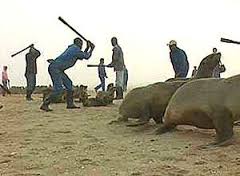Author Information
Growing Numbers Of Mormon Vegetarians And Vegans
Folder:
1 Heal Body Articles
A seven year US government study
was done on nonsmoking nondrinking
Mormons and 7th Day Adventists.
The vegan Adventists had 7 to 8
years longer life expectancy
than nonvegetarian Mormons.
The uric acid in animal flesh, also known as
pre-urine or trioxypurine,
is stronger than the caffein
or dioxypurine that observant
Mormons avoid.
*
Scott Smith, editor of the former periodical Vegetarian World, is
one of several who have written
books on Mormon vegetarians.
*
There are over 13,500 messages on Mormon Veg forum
http://groups.yahoo.com/group/MormonVeg/messages/13667
Dr. Chris Foster and Mormons for Animals - P1/2 - YouTube
► 14:10► 14:10
http://www.youtube.com/watch?v=EA1tUqGDt-4
http://mormonsforanimals.blogspot.com
http://ldsveg.org One of many Mormon vegetarian groups
Chris Foster says why he is a Mormon vegetarian http://hardnewscafe.usu.edu/?p=7687
http://bycommonconsent.com/2009/03/28/good-news-for-vegans/ a Mormon vegan's blog
http://pcrm.org an organization of vegan physicians and other health
professionals
Growing Number Of Mormon Vegetarians And Vegans
http://la.indymedia.org/news/2013/07/261048.php
Information on the growing vegetarian and vegan movements within the LDS Church
http://hardnewscafe.usu.edu/?p=7687
Should Mormons be vegetarians? Yes, says guest speaker
April 14th, 2012
Story and photo by Sean O'Sullivan
LOGAN – A logic and religious history-based argument may leave Mormons
questioning whether or not they should be eating meat.
Chris Foster, professor of philosophy and logic at Utah Valley University, came
to Utah State University Thursday to explain his reasoning behind becoming a
vegetarian, and why he feels it is clear that other people, focusing on Mormons,
should as well.
Being a member of the Church of Jesus Christ of Latter-day Saints isn't what led
Foster to becoming a vegetarian; he was one before he was baptized.
"If something is being killed, I shouldn't have anything to do with it," Foster
said.
But now, he is able to communicate his decision to more people, and has expanded
on his reasoning.
From a logical perspective, Foster explained that killing animals causes them
harm, and it is morally wrong to cause something harm unless the benefits
outweigh the harm caused. But he feels that raising animals for food causes more
harm than benefits, and therefore killing and eating animals is morally wrong.
However, Foster knows changing peoples' minds is going to be tougher than laying
out a series of logical arguments. "We need to be willing to listen to the other
side," he said.
The main argument against vegetarianism is that animals are less important than
humans, Foster said, and he explained that people would be forced to say this.
If animals were allowed to be on the same level as humans, then killing animals
would be akin to killing humans. We as a society deem killing humans to be
terrible, so in order to continue eating meat we have to keep animals on a level
below humans. However, Foster said that animals should be considered equal to
humans.
Then, Foster went in to the religious side of his argument. He was able to find
multiple instances of LDS prophets saying not to kill and eat animals. However,
all the prophets agreed that eating animals was acceptable when no other means
of acquiring food were available.
Prophets such as Joseph Smith, Joseph Smith Jr., Lorenzo Smith and Brigham Young
have all voiced their disapproval of eating animals. However, apostle and member
of the First Presidency George Q. Cannon may have been the most vocal.
"I'd go so far as to say George Q. Cannon was an activist," Foster said.
Foster also showed quotes from scriptures that say killing animals harms them,
and he was able to bring back his logical argument that harming something
shouldn't be tolerated.
"I like that he showed the logic side and then tying it to the LDS Doctrine at
the end," said Quinton Cannon, who is an active LDS member and a vegetarian.
At the end, Foster showed a 12-minute movie about animal conditions in
slaughterhouses. The animals in the video were routinely beaten and mistreated.
Foster said the video was hard for him to watch.
"You don't need philosophy; you don't need religion," said Foster. "It's obvious
that it's abuse; it's obvious that it's unethical."
After the movie, there was a question and answer portion where students brought
up the fact that the LDS church owns ranches for animal raising. These questions
brought about a discussion that had to be cut short so Foster could drive back
to UVU to teach a class.
"I liked the question and answer thing at the end," said Crystal Larsen. "I've
seen the video before, but I liked the questions brought up at the end."
Foster's presentation can be found on the Mormons for Animals homepage, a group
he helped to start.
-saiom shriver-
Free Membership
Who's online
There are currently 2 users and 166 guests online.
